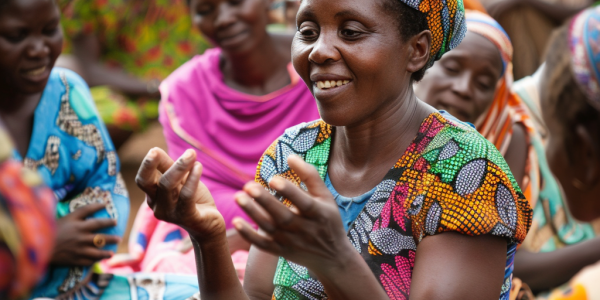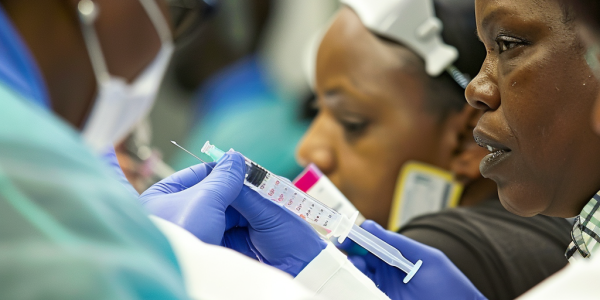Innovative testNtreat Program Enhances Sexual Health Care Access Ahead of World AIDS Day
As World AIDS Day approaches on December 1, the innovative testNtreat program launched by registered nurse Jeffrey Schaffer at Outer Cape Health Services addresses critical barriers to sexual health care in Provincetown. Offering essential services like HIV testing, PrEP, and PEP, this initiative aims to ensure accessible healthcare for all, especially in transient communities. Learn more about how testNtreat is making a difference in the fight against HIV.
Urgent Call to Address HIV Crisis Among Young Women in Sub-Saharan Africa
HIV remains a critical public health challenge in sub-Saharan Africa, disproportionately affecting girls and young women. UNAIDS highlights the urgent need for targeted interventions and resources to combat the epidemic. Young advocates like Gniwali Ndangou exemplify resilience, serving as peer educators in community centers that provide essential HIV testing and prevention education. As the UN aims to eliminate AIDS by 2030, addressing gender inequality and improving healthcare access are vital to protecting vulnerable populations.
WHO Enthusiastic About Lenacapavir’s Promising HIV Prevention Results
The World Health Organization (WHO) praises the interim results of the PURPOSE-2 trial, revealing lenacapavir’s (LEN) remarkable 96% efficacy in preventing HIV transmission. Administered biannually, LEN outperformed daily oral PrEP by 89%, showcasing its potential to revolutionize HIV prevention for diverse populations. As WHO prepares to release comprehensive guidelines, lenacapavir emerges as a promising solution in the global fight against HIV.
Revolutionary HIV Prevention Drug Could Cost Just $40 Annually
Groundbreaking research reveals lenacapavir, a promising HIV prevention drug, could be produced for just $40 annually per patient, significantly lowering costs from the current $42,250. With a recent trial showing 100% protection against HIV, this long-acting injectable could revolutionize prevention strategies and improve access for millions at risk, particularly in low- and middle-income countries.
Long-Acting Injectables Transform HIV Prevention and Treatment
Long-acting injectable medications are transforming HIV prevention and treatment, offering a significant alternative to daily pills. Approved by the EMA and FDA, these injectables like cabotegravir and rilpivirine provide convenient dosing options for individuals at risk or living with HIV, enhancing adherence and reducing stigma. Discover how these innovative therapies are paving the way for improved health outcomes in the fight against HIV.
Lenacapavir Injection Trial Shows Promise in Preventing HIV Infections in Women in Africa
Learn about the groundbreaking PURPOSE 1 trial introducing lenacapavir injections as a promising strategy for preventing HIV infections in women in sub-Saharan Africa. Discover how this new method could revolutionize HIV prevention efforts in a region with high prevalence rates.
Advancements in HIV and Aging Research
Discover the latest advancements in HIV and aging research, and how individuals with HIV are now leading longer, healthier lives. Learn about the National Institute on Aging’s funding opportunities for researchers interested in healthy aging for older adults with HIV, including initiatives focused on women’s health and accelerated aging. Find out how these research projects aim to improve strategies for preventing, treating, and managing HIV infection and its associated conditions.
Namibia Achieves Milestone in Ending Mother-to-Child Transmission of HIV and Hepatitis B
Namibia achieves milestone in fighting mother-to-child transmission of HIV and hepatitis B, becoming first in Africa to do so. With almost universal HIV testing among pregnant women and a 70% reduction in vertical transmission, only 4% of babies born to HIV-positive mothers acquired the virus in 2022. WHO awards Namibia for progress in reducing hepatitis B and combating HIV, highlighting the country’s strategic approach to disease elimination.
England Rolls Out Injectable HIV Antiretroviral Therapy, Faces Challenges
England has initiated the provision of injectable HIV antiretroviral therapy to patients, showing overall effectiveness and positive feedback. However, concerns have been raised due to reported cases of virological failure with drug resistance. Researchers are investigating to enhance the reliability of injectable HIV therapy.
Setback in CRISPR-Based HIV Cure Trial
Learn about the setbacks faced by a groundbreaking CRISPR-based HIV cure attempt. Despite high hopes, the initial trial results were disappointing, highlighting the need for further research and refinement in gene editing therapies for challenging diseases like HIV.










